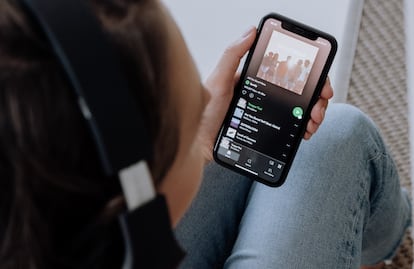Flood of AI-made songs sounds alarm bells in music industry
Spotify has deleted tens of thousands of tracks where bots were posing as listeners to increase the number of streams and raise royalty revenues

Spotify is overflowing with songs made by artificial intelligence (AI) and deleted tens of thousands of them this week in an attempt to stem the spate of fraud. However, the largest audio streaming business in the world notes that the decision did not stem from the artificial origin of the music, but from the fact that the songs were being used to collect royalties on behalf of fraudulent accounts.
While the music platform does not appear to be concerned about distributing songs made with AI, it has shared information about what may be the first case of selling songs that were said to be leaked tracks made by the elusive singer/producer Frank Ocean, but which were in fact made by someone else using AI trained on snippets of the singer’s music.
The scam took place in an online community of music collectors on Discord, a platform where fans and musicians connect, and was first reported by Vice. “The news shows another example of the seismic impact AI is having on the music industry. In this case, a scammer is preying on fans and music collectors who are desperate for new and unreleased music from one of the industry’s biggest, most reclusive stars,” said the publication.
Last month an alleged song by Drake and The Weeknd, generated with software called SoftVC VITS, went viral on social media until it was deleted by TikTok, YouTube and Spotify.
The tens of thousands of songs now removed from Spotify had been generated by Boomy, a platform that uses generative artificial intelligence to create music with just a few clicks and is compatible with any web browser. The reason, though, was because AI favors artificial streaming, in which bots impersonate human listeners and thus inflate the number of times a song is played, generating royalties to the copyright holders. That means that tracks created artificially, without any human musician or producer, end up receiving royalties that should go to real artists. As reported by the Financial Times, the purge removal affected 7% of all Boomy songs available on the platform.
This is nothing new. Before the advent of generative AI tools in the music market, Spotify was already warning artists to reject offers of services to promote their music using bots. In a video posted on its YouTube channel last year, company experts explained the long-term risks of artificial streaming, which can lead to the removal of songs from Spotify and withholding of royalties.
Buying artificial listeners
The problem is directly linked to the business model of streaming platforms such as Spotify or Apple Music, which distribute royalties based on the number of times a song is streamed. The issue has escalated in recent months due to a boom of services that promise success on these platforms through the online sale of streams. A quick Google search for “buy streams on Spotify” will turn up find plenty of ads promising exposure and visibility easily and cheaply. In one of them, 1,000 views on Spotify cost less than €5.
With songs generated by computers and played over and over again by bots, impostors have gained ground on Spotify, which is now looking for ways to stop this fraud, although it has not specified how it is going to do it. “Artificial streaming is a longstanding industry-wide problem that Spotify is trying to eradicate,” a company spokesperson recently told the Financial Times. In France, a study carried out by the National Music Center found that between 1% and 3% of all music played on the most popular streaming platforms in that country had been requested by bots. This figure, from 2021, represents an estimated number of between one billion and three billion fake streams.
As specified on its website, Boomy owns the copyright to all songs created on its platform, although users receive 80% of the distribution rights, so that they can be used for commercial and non-commercial purposes, as in a video for social media or in a podcast. With the recent delisting, Spotify stopped publishing new songs from this company for five days.
More than 14 million songs have already been created with Boomy, which was born two years ago. Its formula is simple and similar to other tools that use generative AI. The user can choose a style, such as electronic or lo-fi music, and the base instruments. Then, it is possible to adapt the rhythms and the user can even add a voice, either their own or someone else’s. In less than a minute, the program generates a supposedly original song, which can be shared or downloaded.
In a message sent to EL PAÍS, Spotify rejected that the main problem is the AI behind these songs: “The purges are not due to the fact that Boomy’s music is generated by AI. It’s about the patterns of activity around a part of that music. Spotify confirmed [to U.S. portal] Music Ally that some songs had been removed after detecting artificial streaming. The service has also excluded broadcasts of that music from its copyright calculations,” said the company.
Despite this, the company has been in the crosshairs of multinationals that control the copyrights of major artists. Universal Music Group, the world’s largest record company, has been warning for months about the proliferation of new songs on platforms such as Spotify, where around 100,000 new songs are added every day. Last month, the Financial Times revealed that the music industry giant had called on streaming platforms to “crack down” on the use of generative AI.
Sign up for our weekly newsletter to get more English-language news coverage from EL PAÍS USA Edition
Tu suscripción se está usando en otro dispositivo
¿Quieres añadir otro usuario a tu suscripción?
Si continúas leyendo en este dispositivo, no se podrá leer en el otro.
FlechaTu suscripción se está usando en otro dispositivo y solo puedes acceder a EL PAÍS desde un dispositivo a la vez.
Si quieres compartir tu cuenta, cambia tu suscripción a la modalidad Premium, así podrás añadir otro usuario. Cada uno accederá con su propia cuenta de email, lo que os permitirá personalizar vuestra experiencia en EL PAÍS.
¿Tienes una suscripción de empresa? Accede aquí para contratar más cuentas.
En el caso de no saber quién está usando tu cuenta, te recomendamos cambiar tu contraseña aquí.
Si decides continuar compartiendo tu cuenta, este mensaje se mostrará en tu dispositivo y en el de la otra persona que está usando tu cuenta de forma indefinida, afectando a tu experiencia de lectura. Puedes consultar aquí los términos y condiciones de la suscripción digital.









































